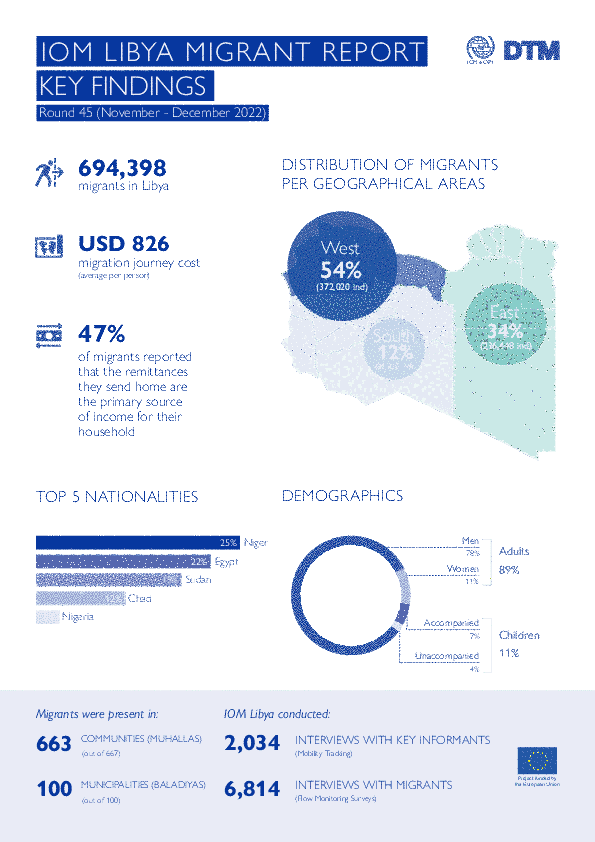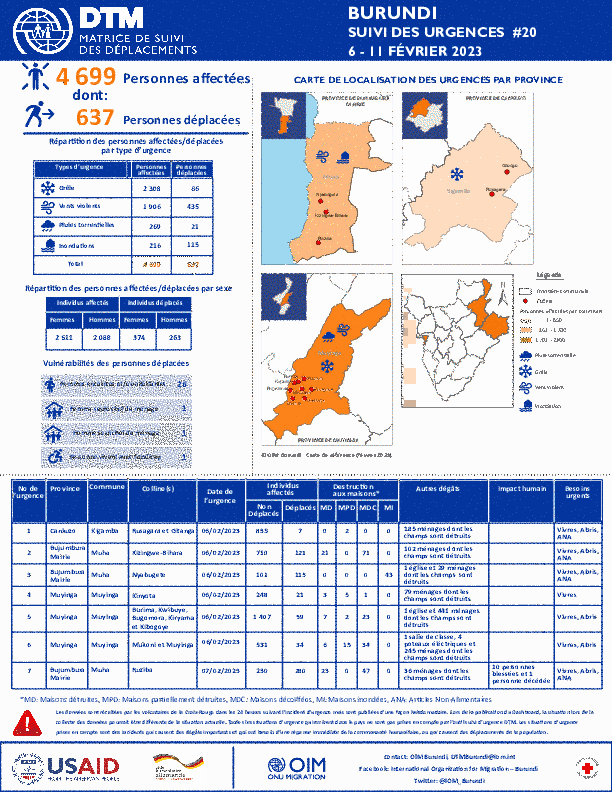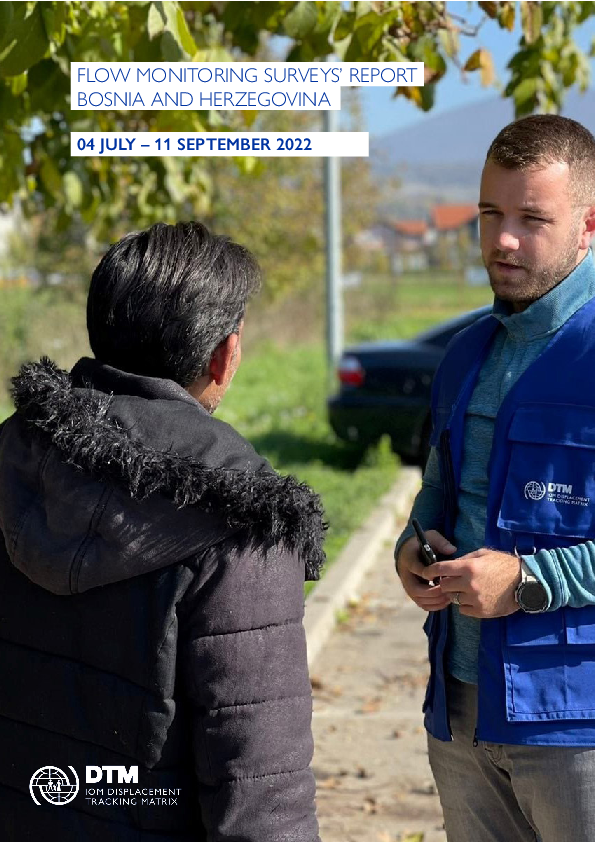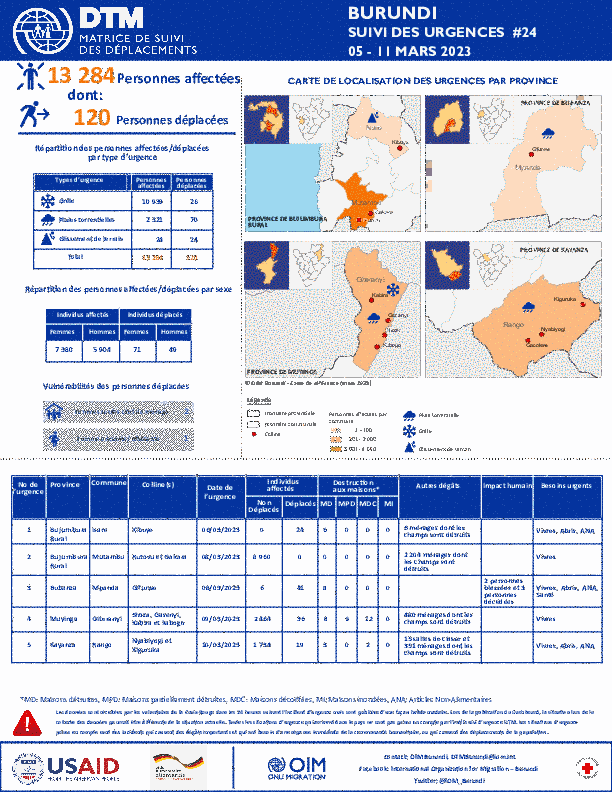-
Countries
-
Data and Analysis
-
Special Focus
-
Crisis Responses

Contact
DTM Libya, DTMLibya@iom.int
Language
English
Location
Libya
Period Covered
Nov 01 2022
Dec 31 2022
Activity
- Flow Monitoring
- Mobility Tracking
- Baseline Assessment
This infographic presents the key findings of Round 45 of the mobility tracking component of the Displacement Tracking Matrix (DTM) programme in Libya.

Contact
DTMUkraine@iom.int
Language
English
Location
Ukraine
Period Covered
Jan 01 2023
Feb 28 2023
Activity
- Return Intention
- Mobility Tracking
The Conditions of Return Assessment is a multi-sectoral location-level assessment (MSLA) conducted with local authority key informants at the settlement or city-raion level in areas of return across Ukraine. Data collection for Round 1 took place between the 1 January and 28 February 2023 across 15 hromadas in 6 oblasts. To inform targeted interventions aimed at alleviating the vulnerability that stems from poor physical and social conditions in areas of return, the Conditions of Return Assessment provides granular data on where returns are occurring, where those who have returned are most vulnerable and why.

Contact
DTM Burundi, DTMBurundi@iom.int
Language
French
Location
Burundi
Period Covered
Feb 06 2023
Feb 11 2023
Activity
- Mobility Tracking
- Event Tracking
Entre le 6 et le 11 février 2023, le DTM a identifié 4 699 personnes affectées, dont 637 personnes déplacées par la grêle, les vents violents, les pluies torrentielles et les inondations dans les provinces de Bujumbura, Muyinga et Cankuzo.
Contact
DTM Nigeria, iomnigeriadtm@iom.int
Location
Nigeria
Activity
- Mobility Tracking
- Baseline Assessment
Period Covered
Feb 14 2022 -Mar 30 2022
A baseline assessment is a sub-component of mobility tracking. It aims to collect data on IDP, migrant or returnee population presence in a defined administrative area of the country.
Population Groups
Survey Methodology
Unit of Analysis Or Observation
Type of Survey or Assessment
Keywords
Geographical Scope
Administrative boundaries with available data
The current dataset covers the following administrative boundaries
Contact
DTM Nigeria, iomnigeriadtm@iom.int
Location
Nigeria
Activity
- Mobility Tracking
- Baseline Assessment
Period Covered
Jun 07 2022 -Jul 06 2022
A baseline assessment is a sub-component of mobility tracking. It aims to collect data on IDP, migrant or returnee population presence in a defined administrative area of the country.
Population Groups
Survey Methodology
Unit of Analysis Or Observation
Type of Survey or Assessment
Keywords
Geographical Scope
Administrative boundaries with available data
The current dataset covers the following administrative boundaries
Contact
DTM Nigeria, iomnigeriadtm@iom.int
Location
Nigeria
Activity
- Mobility Tracking
- Baseline Assessment
Period Covered
Feb 14 2022 -Mar 30 2022
A baseline assessment is a sub-component of mobility tracking. It aims to collect data on IDP, migrant or returnee population presence in a defined administrative area of the country.
Population Groups
Survey Methodology
Unit of Analysis Or Observation
Type of Survey or Assessment
Keywords
Geographical Scope
Administrative boundaries with available data
The current dataset covers the following administrative boundaries

Contact
DTM Europe, DTMMediterranean@iom.int
Language
English
Location
Bosnia & Herzegovina
Period Covered
Jul 04 2022
Nov 11 2022
Activity
- Flow Monitoring Survey
- Flow Monitoring
- Mobility Tracking
This report presents the results of the fourth round of the Displacement Tracking Matrix (DTM) Flow Monitoring Surveys (FMS) implemented in Bosnia and Herzegovina (BiH). The data was collected from 4 July to 11 September 2022, in four temporary reception centres (TRCs). IOM interviewed a total of 303 individual respondents.
Flow Monitoring Surveys are a type of qualitative survey, which provide a snapshot of the profiles, experiences and needs of migrants residing in TRCs in BiH. The survey asks questions on demographics, education and employment backgrounds, the circumstances of the migration journey and migration factors, as well as future intentions.

Contact
DTM Burundi, DTMBurundi@iom.int
Language
French
Location
Burundi
Period Covered
Mar 05 2023
Mar 11 2023
Activity
- Mobility Tracking
- Event Tracking
Entre le 5 et le 11 mars 2023, la DTM a identifié 13 284 personnes affectées, dont 120 personnes déplacées par la grêle, les pluies torrentielles et les glissements de terrain dans les provinces de Bujumbura, Bubanza, Kayanza et Muyinga.
Contact
DTM Burundi, DTMBurundi@iom.int
Location
Burundi
Activity
- Mobility Tracking
- Event Tracking
Period Covered
Mar 05 2023 -Mar 11 2023
Activated on an ad hoc basis, the DTM Emergency Tracking provides early field reports at the beginning of a complex crisis, allowing IOM to gather, consolidate and disseminate baseline information on displacement and return figures at the onset of a newly emerging crisis. The DTM Emergency Tracking relies heavily on information provided by RARTs or partners within the humanitarian community about an unfolding situation. The Emergency Tracking gathers data through IOM Burundi’s extended network of key informants, who provide basic information on the new displacement, be it of IDPs or returnees, or both, including numbers, location and shelter types. While IOM DTM strives to provide best estimates, the Emergency Tracking aims to be a quick monitoring tool with real-time data turnover ranging from 24 to 72 hours following its activation.
Population Groups
Survey Methodology
Unit of Analysis Or Observation
Type of Survey or Assessment
Keywords
Geographical Scope
Administrative boundaries with available data
The current dataset covers the following administrative boundaries
Contact
iomyemendtm@iom.int
Location
Yemen
Activity
- Flow Monitoring
Period Covered
Feb 01 2023 -Feb 28 2023
In February 2023, IOM Yemen DTM recorded 10,726 migrants entering Yemen, with a slight increase of less than 1 per cent over last month (10,707). In Lahj (7,791 migrants) DTM has observed a slight drop in arrivals, (-1) per cent decrease from last month (7,904 migrants). This stands in contrast to Shabwah (2,931) which recorded a minore increase this month by 5 per cent. migration flows shifted from Obock, Djibouti (-1%) towards Bari, Somalia (+5%). The overall increase could be linked to weather conditions, sea tides and decreased coast guard patrolling in Djibouti. While travel had been primarily due to economic reasons in the first half of 2022, DTM has been recording conflict induced movements since August 2022, being the reason for 26 per cent of all incoming movements in February 2023. All conflict motivated travel was recorded in Shabwah coming from Bari, Somalia (32% children, 13% women, and 55% men).
Due to the deteriorating humanitarian crisis in Yemen and the challenges in moving towards KSA, many migrants opted to return to the Horn of Africa. DTM teams in Djibouti recorded that during February 2023, a total of 493 migrants took the risky return by boat from Yemen to travel home. DTM teams in Somalia further recorded the arrival of 27 returning Somali nationals returning from Yemen Lowyacado and Bossaso. Meanwhile, DTM reported 4,338 Yemeni returns from KSA in February 2023, compared to 5,100 in January 2023.
Between 1 January and 28 February 2023, DTM recorded 21,433 migrants and 9,438 Yemeni migrant returnees to Yemen.
Population Groups
Survey Methodology
Unit of Analysis Or Observation
Type of Survey or Assessment
Keywords
Geographical Scope
Administrative boundaries with available data
The current dataset covers the following administrative boundaries